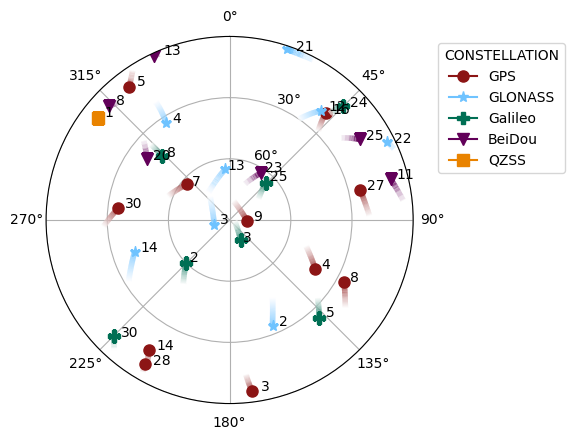gnss_lib_py
gnss_lib_py is a modular Python tool for parsing, analyzing, and
visualizing Global Navigation Satellite Systems (GNSS) data and state
estimates.
It also provides an intuitive and modular framework allowing users to
quickly prototype, implement, and visualize GNSS algorithms.
gnss_lib_py is modular in the sense that multiple types of
algorithms can be easily exchanged for each other and extendable in
facilitating user-specific extensions of existing implementations.

gnss_lib_py contains parsers for common file types used for
storing GNSS measurements, benchmark algorithms for processing
measurements into state estimates and visualization tools for measurements
and state estimates.
The modularity of gnss_lib_py is made possibly by the unifying
NavData class, which contains methods to add, remove and modify
numeric and string data consistently.
We provide standard row names for NavData elements on the
reference page.
These names ensure cross compatibility between different datasets and
algorithms.
Source Code
All source code is available on GitHub at github.com/stanford-navlab/gnss_lib_py.
Code Organization
gnss_lib_py is organized as:
├── data/ # Location for data files
└── unit_test/ # Data files for unit testing
├── dev/ # Code users do not wish to commit
├── docs/ # Documentation files
├── gnss_lib_py/ # gnss_lib_py source files
├── algorithms/ # Navigation algorithms
├── navdata/ # NavData data structure
├── parsers/ # Data parsers
├── utils/ # GNSS and common utilities
├── visualizations/ # plotting functions
└── __init__.py
├── notebooks/ # Interactive Jupyter notebooks
├── tutorials/ # Notebooks with tutorial code
├── results/ # Location for result images/files
├── tests/ # Tests for source files
├── algorithms/ # Tests for files in algorithms
├── navdata/ # Tests for files in navdata
├── parsers/ # Tests for files in parsers
├── utils/ # Tests for files in utils
├── visualizations/ # Tests for files in visualizations
└── test_gnss_lib_py.py # High level checks for repository
├── CONTRIBUTORS.md # List of contributors
├── build_docs.sh # Bash script to build docs
├── poetry.lock # Poetry specific Lock file
├── pyproject.toml # List of package dependencies
└── requirements.txt # List of packages for pip install
In the directory organization above:
The
algorithmsdirectory contains localization algorithms that work by passing in aNavDataclass. Currently, the following algorithms are implemented in thealgorithms:
Weighted Least Squares
Extended Kalman Filter
Calculating pseudorange residuals
Fault detection and exclusion
The data parsers in the
parsersdirectory allow for loading GNSS data intognss_lib_py’s unifyingNavDataclass or parsing precise ephemerides data. Currently, the following datasets and types are supported:The
utilsdirectory contains utilities used to handle GNSS measurements, time conversions, coordinate transformations, visualizations, calculating multi-GNSS satellite PVT information, satellite simulation, file operations, etc.
Installation
gnss_lib_py is available through pip installation with:
pip install gnss-lib-py
For directions on how to install an editable or developer installation
of gnss_lib_py on Linux, MacOS, and Windows, please
see the install instructions.
Tutorials
We have a range of tutorials on how to easily use this project. They can all be found in the tutorials section.
Reference
References on the package contents, explanation of the benefits of our custom NavData class, and function-level documentation can all be found in the reference section.
Contributing
If you have a bug report or would like to contribute to our repository, please follow the guide on the contributing page.
Troubleshooting
Answers to common questions can be found in the troubleshooting section.
Attribution
This project is a product of the Stanford NAV Lab and currently maintained by Ashwin Kanhere (akanhere [at] stanford [dot] edu) and Derek Knowles (dcknowles [at] stanford [dot] edu). If using this project in your own work please cite either of the following:
@inproceedings{knowles_kanhere_modular2022,
title = {A Modular and Extendable GNSS Python Library},
author={Knowles, Derek and Kanhere, Ashwin V and Bhamidipati, Sriramya and Gao, Grace},
booktitle={Proceedings of the 35th International Technical Meeting of the Satellite Division of The Institute of Navigation (ION GNSS+ 2022)},
institution = {Stanford University},
year = {2022 [Online]},
url = {https://github.com/Stanford-NavLab/gnss_lib_py},
doi = {10.33012/2022.18525}
}
@inproceedings{knowles_kanhere_baselines_2023,
title = {Localization and Fault Detection Baselines From an Open-Source Python GNSS Library},
author={Knowles, Derek and Kanhere, Ashwin V and Gao, Grace},
booktitle={Proceedings of the 36th International Technical Meeting of the Satellite Division of The Institute of Navigation (ION GNSS+ 2023)},
institution = {Stanford University},
year = {2023 [Online]},
url = {https://github.com/Stanford-NavLab/gnss_lib_py},
}
Additionally, we would like to thank all contributors to this project.